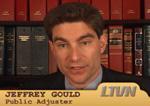Dealing with Disaster
DAVID PISANIC: A lot of times people have the attitude when a loss occurs, they can sit back and pull their arms and do nothing. That insurance carriers would come in and make it all better for them and they do not have to hire contractors, they do not have to be there when the contractors arrive. And most people do not understand what their part of the bargain is, but it is a very important part especially in property damage claims.
JEFFREY GOULD: The policy requires that you notify them as soon as possible after discovering the loss.
DAVID PISANIC: You have to make sure that no additional damage would take place as a result of weather, for example, if the things were exposed.
JEFFREY GOULD: Boarding up the widows, putting a tarpaulin on the holes on the roofs.
DAVID PISANIC: If you let a month go by and did not do anything about paying somebody to get on to the roof to put temporary repairs on it and your antiques were ruined, the insurance company is going to say to you at that point, too bad, you did not do your part of the job.
JEFFREY GOULD: The ultimate responsibility for the claim and to ensuring the claim is presented correctly is on the homeowner.
DAVID PISANIC: You have to give the insurance company all the information they want in terms of values of your property.
JEFFREY GOULD: You are the only one who knows what you lost. You are the only one who knows what was in your property.
DAVID PISANIC: That is a very important part of the insurance contract that you do your job as well.
JEFFREY GOULD: The only way to ensure that your claim is being presented in your best interest is to do it yourself or at least control the process.
DAVID PISANIC: The bottom line is nobody really comes out better for the most part because it is pretty much a hassle. You have to live through the repairs of those damages.



